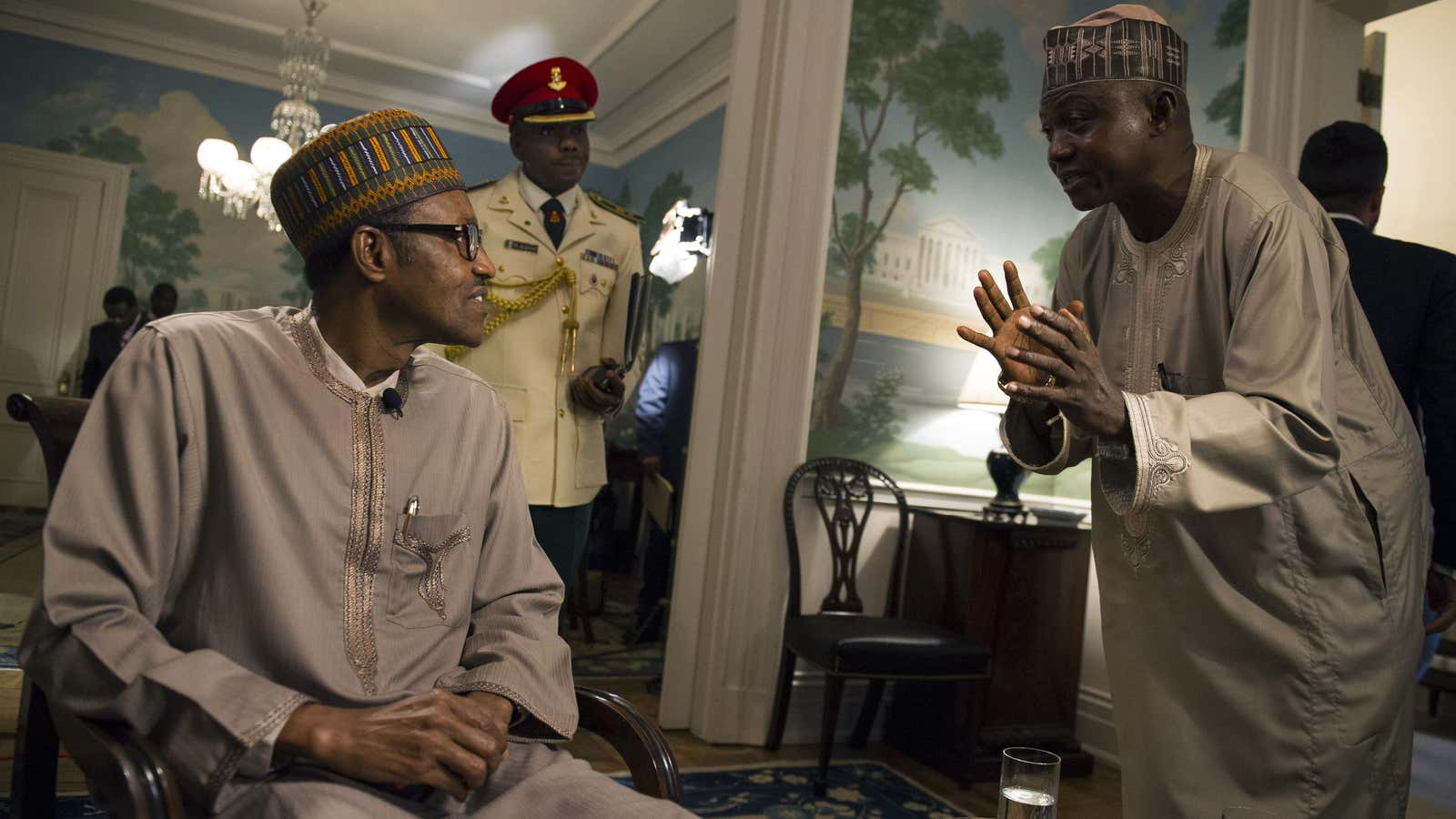We should probably get the obvious points out of the way.
Nigerian president Muhammadu Buhari’s comments about his wife were embarrassing both because he had no qualms belittling his wife in public and because his comments made it known about where he thinks a woman “belongs”. His comments responded to his wife’s BBC interview, where she said a lot of things that were shocking and showcased an ignorance of how a democracy is supported to work and advocated many things one hopes the president ignores. But the president’s comments were also embarrassing because he said it sat next to Angela Merkel, the female chancellor of Germany.
It is also worth noting that this latest incident is just one in the number of off-color remarks that has left many outraged and Nigerians divided. Many Nigerians were aghast by the clumsy response to a question on inclusive development that he spun into a consideration of whether people who voted en masse for him can be treated the same as those who did not.
Also, during his media chat last December where he betrayed an impatience with due process in his response on rule of law in the fight against corruption and was visibly bemused at ethnic marginalization concerns with respect to key appointments, his body language irritable as though he could not be bothered to respond to emerging questions Nigerians had about where their country was going. He’s also shown a preference for speaking to foreign media over local media, and has not had a media chat since the last one last December.
To make matters worse, official communication from his team is often as defensive and condescending as that of their boss. In response to the outrage at the presidents’ derisive comments, presidential spokesman Garba Shehu showed no understanding at people’s concerns about their president making sexist comments while standing next to one of the most powerful women in the world. He responded by calling Buhari’s comments mere “banter” and wondered why people can’t take a joke. This kind of response is typical of the communications teams.
Following a surprise raid on several judges this month wherein it was alleged that due process wasn’t followed, Shehu released a statement where he scolded media for exploiting Nigeria’s fault lines instead of simply addressing the legitimate concerns about the country’s rule of law process. His colleague Femi Adesina is infamous for deriding critics as “wailing wailers” and insisted that any talk of Nigerians suffering economic hardship due to the recession is “mendacious”.
In addition to condescending posts on Twitter, Shehu also, unwittingly, does a rather good job of making Buhari seem out of touch. He’s said the president would rather read cartoons than perspectives of ordinary Nigerians inveighing against the country’s myriad problems in newspapers. Media managers and spokespeople cannot help their bosses’ slip-ups, but with media managers such as these, it’s almost safe to assume the president was not properly briefed on possible responses to news of his wife’s controversial BBC interview. It’s fairly obvious the government communications team had at least 24 hours to prepare after Sahara Reporters published a story saying a controversial BBC interview with Mrs Buhari was coming. A little bit of prep might have helped avoid betraying the president’s annoyance on an international stage.
Nigeria is a country in the middle of crises, some more obvious than others. Not only is there obviously a recession that is causing a real threat to the average Nigerians’ livelihood, a foreign exchange crisis largely of the government’s making, and threats to the country’s internal security with Fulani herdsmen, Boko Haram and increased militancy in the Niger Delta, we also face huge gaps in infrastructure, education, and healthcare that loom large and threaten the country’s future. These are serious times that call for serious policies and the government should own the challenges before it and engage with Nigerians in a respectful manner. It is the least the country deserves from its government.
The president should leave us out of his domestic dramas while he is at it.
